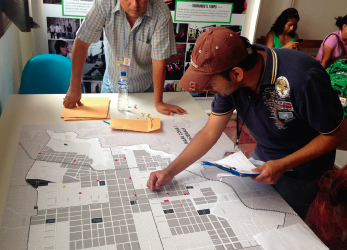Organization: Empresa Metropolitana de Vivienda y Desarrollo Urbano, Municipalidad de Guatemala (EMVDU)
Category: Vivienda, acceso al suelo y regeneración urbana
Context
Issues:
Guatemala City lacks the mechanisms for increasing access for population below the poverty line to urbanized land and decent and affordable housing, located close to employment sources, provided with equipment and transport.
Project objective:
To innovate municipal management in the social housing field, particularly in the land access mechanism and in being a replicable model. Specifically, it is a pilot project, which consists of a housing complex in the form of apartments for 50 families (apartments), approximately 225 inhabitants, prioritizing families below the poverty line and in extreme poverty; 92% of them have a monthly income between 1.5 and 3 times the minimum wage. 72% of households in the city and its outskirts are under the poverty line, INE-ENCOVI 2017). The project is managed by a cooperative whose partners have access to housing through use and habitation rights. It includes mothers head of households as 50% of the direct beneficiaries, Mayas and Garifunas as 15%, and households with income sources from the formal economy as 30%, (EMVDU, 2018). Through the renovation master plan that, in addition to the housing project, includes an ecological park and equipment, 42,700 inhabitants of area 17 are benefited.
Scope: Municipal, Guatemala City with nationwide potential
Results
Achieved Results
- Self-managed cooperative group of the pilot project strengthened since 2014 in its social organization, as well as administrative and financial capabilities. After promotion of and training in continuous saving, the cooperative has its own capital, from which a Relief Fund is derived, that would support financial difficulties for up to 3 months for active families; thus the collective collateral system is outlined, which facilitates financial inclusion to population under the poverty line.
- Financial model for a collective mortgage credit, which has as collateral the right to use public land in favor of the cooperative for a period of 50 years. The model has been designed along with one of the most important commercial banks in the country, which projects economic and social development objectives. The entity offers a term of up to 25 years and 8% interest rates with insurance, giving 1 year of grace during the execution period, which allows families to continue covering the rental cost and continue with their savings goals, prior to the accommodation stage.
- Method (replicable) agreed upon with families and the Municipal Cadastre office, which allows estimating social value of the right to use land for housing.
- Collaboration with the municipality, which provides current and long-term institutional support, facilitates access to urbanized land with social value, subsidized multidisciplinary technical assistance, and urbanization support; with the banking system (collective mortgage credit); with the private sector (materials supplier with a grace period); and organized civil society (self-management, savings capital, labor). It will be coordinated with the national government in the future, as families have the right to request a subsidy deposit from the Guatemalan Housing Fund.
- Having legal instruments for land management as agreed upon with families, reviewed during legal advisory and currently pending approval by the Municipal Council; they provide a relevant administrative and legal precedent for future regulations of general nature. Having procedures approved by the Board of Directors of the EMVDU, which enable managing and implementing the demonstration projects of the Productive Housing Program.
Expected Results
- Master plan construction start, park area and urbanization in 2018, apartments construction beginning in 2019, accommodation expected by 2020.
- 225 persons assisted, of whom 47% are children (the program prioritizes families with school-age children), 15% live in overcrowding conditions, including a 20% minimum of families which today live at risk.
- Through the right to collective use of the land, to achieve a sustainable model of the social purpose of cooperative-municipal housing, of the inclusive financing scheme and of maintenance of the urban-architectural quality of the project.
- The program is to be reapplied and assist at least 250 more families, which shall compose 5 or 6 cooperatives in the next few years. The land management mechanism, the new administrative municipal frameworks and frameworks of involved parties (banking and private sector), will contribute to reaching this goal in one or two municipal administrations (4 or 8 years).
Person/Contact: Eva Campos/ e.campos@urbanistica.org.gt
